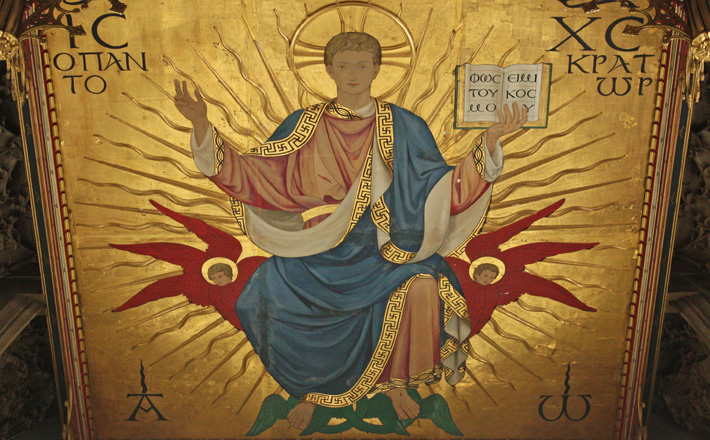Commentary on Luke 6:20-31
Blessed are the poor. Right.
There is a lot that follows in this fascinating passage, but we might as well stop right here. The word for “blessed” (makarios) is interesting enough, with its suggestion of quasi-divine happiness and good fortune, and someone (usually a preacher, sometimes a greeting-card poet) always remembers that money can’t buy happiness and that the best things in life aren’t things. Someone else who loves musical theatre remembers that it’s no disgrace to be poor, but it’s no great honor either, and Tevye begins dancing around the sermon, all quaint and ethnic.
All this is fine, and even helpful. Some of the most generous people I have known have been people who had the least in terms of financial resources, and research on charity appears to bear this out. It is also true that some of the people most celebrated in public for their lavish gifts have, in fact, given only a bit of the froth off the top of their tenth latté of the morning, never mind that the gift ran to six or seven figures in the newspaper. These things are worth knowing and reflecting upon.
But before we get misty-eyed about all of this, we ought to notice the word used to name those people who are so intensely theologically happy. They are the poor. The word carries all sorts of connotations and even denotations in English and in contemporary society. All of them matter for a preacher, since every word you use drags in with it all sorts of baggage (contraband and otherwise). But the word in Greek has its own reality, and since Jesus speaks out of the Bible in Greek (regardless of what language he spoke out of his mouth), we ought to pause and hear the Greek word and taste its realities.
The word in Greek is ptochoi. It is the regular word for “poor people.” Nothing surprising in that. It is not some kind of specialized word, not a set-aside theological word, not an odd relic from another world. It just means “poor people.”
But listen to the word. (And it’s best to listen to a word by saying it aloud.) What does your mouth do when you say, “ptochoi”? The ch, of course, renders the letter chi, and has the sound of the “ch” in Bach, but the part of the word that catches my eye is the first part, the first two letters, in fact. Not a lot of words start with “pt”, and those that do are interesting. There is, of course, ptochoi, the word for people who are poor, but that word does not exist by itself as an isolated unit of meaning.
“Ptochoi,” like every word we speak, is part of a web of sound and association, of meaning and hinting. The task is to listen to these sounds and to test the web of meaning. A fair number of the words that begin with “pt” have something to do with wings and/or feathers (thus the English word, pterodactyl). It is a safe bet that Jesus is not associating the poor with either dinosaurs or birds, though it is possible that people in Luke’s audience thought of poor people as that scurrying flock of beggars that swirls (pigeon-like) around public squares hoping to pick up stray crumbs. The word does, indeed, connote begging.
The “pt” sound also shows up in words that describe sudden fright and flight, which maybe catches something of the state of the public poor in both the ancient and modern world. Beggars in crowds need to be nimble. Wealthy benefactors sometimes grow suddenly weary of their charity and accuse those whom they have impoverished of picking their pockets. Those who work two or three minimum wage jobs without benefits learn that at any moment they might again be identified as the embodiment of the dead-weight laziness that is both killing jobs and driving up the cost of health care.
Perhaps, more significantly, the “pt” sound shows up in words that express vertigo in the face of falling. That means that the word “ptochoi” would likely have reminded any ancient audience that life is a tightrope act, that most of us are one serious illness away from destitution. “How the mighty have fallen!” expresses dismay at the death of Jonathan in 2 Samuel, but it also reminds people then and now of the fragility of our hold on solidity and power.
Jesus’ words of blessing are picking up body and character. The people who are blessed are not simply an economic class characterized by their net worth, they are people who must compete against each other, swirling and skittering in the imposed act of begging, ready to scatter the moment the powerful become peevish. They are people who embody signs of how easily any one of us might fall.
It is at this point that one final association with the sound “pt” needs to be heard. The sound begins the word “ptuo,” which is Greek for “I am spitting.” (The English cartoon sound, “ptooey,” comes directly from this verb.)
Blessed are the spat-upon.
There’s a blessing to stop your heart.
Or, it may be that the connotation being hinted at is the superstitious practice of spitting to ward off evil spirits or outcomes. This practice surely shows up in the ancient Greek use of the word ptuo. It also shows up in Jewish practice. I was talking with a friend about spitting. My friend’s mother grew up in Eastern Europe, a Jew who escaped the Nazi camps and survived those horrible days. He said that whenever his mother heard that misfortune had befallen someone, she would ritually spit three times, acting automatically to protect her children and her world from the danger and evil that stalk us all.
Blessed are the people who are made into warning signs of the possibility of catastrophic collapse, of abject failure, people who are impossibly weary of the phrase, “There but for the grace of God….” It is some odd “Kingdom of God” to be associated with such people. You don’t know what that means, and neither do I.


November 3, 2013